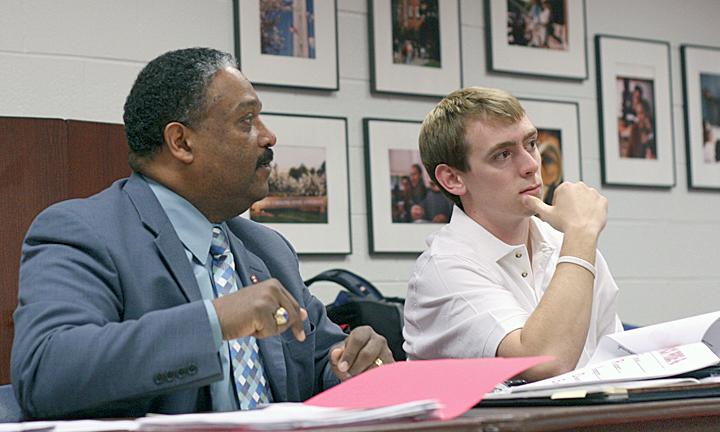According to the executive summary of the committee’s preliminary report, Oblinger appointed the Task Force to assess and recommend improvements to the University’s Free Expression Tunnel and Brickyard use policies, use of the Code of Conduct in punishing hate speech offenders, and to get an overall feel for the campus climate in the wake of the Nov. 5 incident in the Tunnel that involved racist comments and threats against newly elected President Barack Obama’s life.
The committee reviewed feedback students submitted online. Student Body President Jay Dawkins noted that many more students responded when news arose of the possible closing of the tunnel.
“The discussion today was how overwhelming the feedback was in keeping the tunnel and the support of the ideas put forth from the climate committee like ways we can improve discussion,” Dawkins, a junior in civil engineering, said.
Overall, Dawkins said the University was not in a position to determine what could or could not be displayed in the tunnel.
“We can’t, as an institution, punish students for not living up to values,” Dawkins said.
But, Dawkins said support for the tunnel was continuous from the feedback whether from N.C. State students or students from other colleges, alumni and faculty and staff.
“Studentrs from other universities write in talking about how it’s such a privilege for us to have a free expression tunnel on campus, and I believe that’s so true,” he said.
Vice Chancellor of Student Affairs Tom Stafford agreed, and also pointed out how difficult it would be to monitor what’s in the tunnel.
“The problem with the tunnel is there is no way to monitor [content],” Stafford said.
Dawkins said the task force decided to keep the tunnel and examine ways to make it safer, like improving the lighting. The committee decided to not recommend the purchase of web cams but decided to keep the public safety cameras, and with improved lighting, Campus Police can better identify people who vandalize the bricks around the tunnel.
The task force also recommended encouraging the bookstore and C-stores to carry spray paint, so students can have more easy access.
“Most students on campus don’t have the ability to stop what they’re doing and get spray paint,” he said.
Although the idea of including a free expression tunnel wall in the new Student Life Master Plan was tossed around, Dawkins said the committee decided to focus on what the University has available now.
Jose Picart,Vice Provost for Diversity & Inclusion and chair of the committee, said the committee will propose a seminar be included along with New Student Orientation to help acquaint new students to the concept of responsible free expression, as well as to establish an advisory sub-committee to be responsible for encouraging moral behaviors, especially in the case of Free Expression Tunnel usage.
“[The committee’s] responsibility [will be] to enhance values and ethics,” Picart said.
Dawkins said the committee will focus on creating a foundation of ethics on campus.
“Groups of people will come together to make some concrete decisions,” Dawkins said. “If we’re going to have a campus creed, how will we share that with the community and how will we get input on that?”
Dawkins stressed that the committee won’t create new rules or regulations, but will only help to solidify the ethics students already have.
“We’re not aiming to change the campus’ values,” Dawkins said. “We’ll instead seek to reinforce the values that already exist.”
Editor-in-Chief Saja Hindi and Staff writer James Cox contributed to this story.








